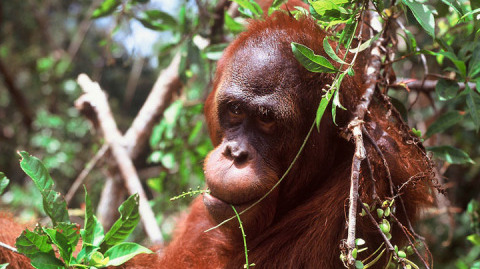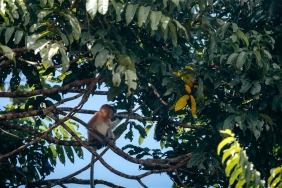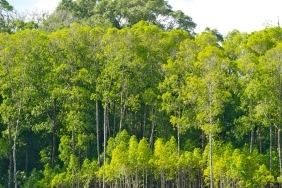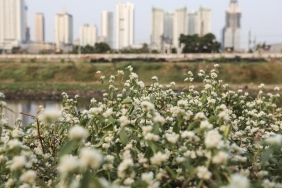DEWI'S EXPERIENCE WITH BORNEAN ORANGUTANS
"It is my dream to be able to work on conservation issues. I joined and became a WWF staff after 2 years as a WWF volunteer in West Kalimantan, specifically in the field of Orangutan and biodiversity survey conservation," said Dewi.
This woman from Pontianak first knew and 'fell in love' with WWF in 2008 from a lecturer when she was studying her undergraduate degree at Tanjungpura University, Pontianak, West Kalimantan. Her love continues until now Dewi in her 9th year with WWF, Dewi took a position as a species specialist in the Muller Schwaner Arabela Area.
The Mueller - Schwaner - Arabela region is a 4.3 million ha area located in West and Central Kalimantan, which is one of WWF-Indonesia's priority areas. This area is home to 7,500 individual Bornean orangutans (Pongo pygmaeus), or about 10% - 20% of the remaining population in Borneo. Not only that, this area also holds other species such as Helmeted Hornbill (Rhinoplax vigil), Honey Bear (Helarctos malayansus), Kelempiau Gibbon (Hylobates muelleri), hundreds of bird species, reptiles, and many more.
In her current profession, Dewi has a great responsibility related to Orangutan conservation efforts in the forests of Borneo. She will regularly document conservation activities, and provide educational and informative content on animal protection to relevant parties.
"I also have to ensure the implementation of Orangutan surveys and monitoring goes according to the work plan. I also collect accurate information in the field as a reference for evaluating the achievement of targets in the Orangutan conservation program," explained the woman who is currently pursuing her master's degree in Environmental Science at Tanjungpura University.
Currently, the situation of orangutans in Indonesia has improved, although not significantly. This can be seen from the better public awareness in the past 2 years. Evidently, there are reports made by the community related to the maintenance of Orangutans to the West Kalimantan BKSDA, but what still needs to be a concern is when Orangutan habitat is converted into concession areas.
"The biggest challenge now is how to encourage concession holders (land clearing permits for mining and logging) to be more concerned about Orangutan and habitat conservation. Because that is where the conflict between orangutans and humans will arise," Dewi Puspita Sari explained.
Dewi is struggling to maintain Orangutan habitat in the forests of Borneo. It should be noted that most of the orangutan population is outside of conservation, especially the forest areas around Pontianak city which are pockets of Orangutan habitat. Therefore, participation from concession license holders is needed to jointly protect orangutan habitat.
Not only that, Dewi is also trying to invite the entire community to be able to actively participate in the protection of Orangutans in their natural habitat, as part of her conservation efforts. The whole community in this case also involves cooperation from multiple parties ranging from the community itself, the government, the private sector and also Non-Governmental Organizations (NGOs). The increasing public awareness of orangutans is an important achievement for Dewi herself. Although the awareness is not yet comprehensive among the community, Dewi hopes that related parties such as BKSDA, GAKKUM and the Police will take firm action against cases of Orangutan trafficking.
"What fascinates me the most is when I get to see Orangutans in their natural habitat. Knowing that the local community cares about protecting and securing Orangutan habitats and populations is truly amazing. More than words can say!" Dewi explained.
Dewi expressed her feelings because for her, not everyone has the opportunity to go to a natural forest, let alone see wild Orangutans. The few times she has seen Orangutans while monitoring has truly been a valuable experience in her career.
"It was like a lucky moment," Dewi explained how happy she was when she got the chance to see Orangutans in several areas, such as: Bukit Peninjau, Meliau Village, Melemba Village, Kapuas Hulu Regency.
Another emotional event that Dewi experienced was when the judge handed down a sentence to the perpetrator of the online Orangutan trade. Dewi said she was happy that the law could be enforced, although not optimally as stated in Law No. 5/1990 on the Conservation of Living Natural Resources and Ecosystems.
"At least it has given a deterrent effect to wildlife criminals. This is a concrete example of the punishment that must be received by perpetrators who experience remorse due to their own actions. Perhaps they did not expect to end up behind bars because of the Orangutan trade. But that's the price they have to pay for breaking the law," Dewi said.
Today, Dewi's biggest hope is that no more orangutans will be released from their habitat, and that there will be public awareness and private sector willing to provide conservation areas for orangutans. In addition, it is hoped that special corridors will be built for Orangutans and that there will be cooperation between the government, the community, the private sector and NGOs in efforts to protect Orangutan conservation.
"Without Orangutans, the ecosystem will become unbalanced. The danger is very real. Land conversion has taken away almost 60% of the Orangutan's habitat. Therefore, awareness is needed by the government and society to protect them together. Orangutans bring value to human life," Dewi concluded.





